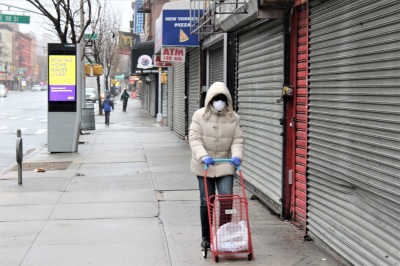Anyone you meet could be infected: How faith empowers us to face the unknown

By now you’ve seen the prediction that the US death toll from COVID-19 could rise above 100,000 people. We could see 2,214 deaths a day at the nation’s peak in two weeks.
One of the most difficult dimensions of this disease is the degree to which it can be transmitted by people who show no symptoms.
The director of the CDC was asked this week if his agency has learned anything new about the virus in recent weeks. He stated that “a significant number of individuals that are infected remain asymptomatic. That may be as many as 25 percent. That’s important, because now you have individuals that may not have any symptoms that can contribute to transmission, and we have learned that in fact they do contribute to transmission.”
He added that those who develop symptoms are “shedding significant virus . . . probably up to forty-eight hours before [they] show symptoms.”
In other words, every person we meet could infect us with a deadly virus, whether they know it or not. And we could have the virus while being asymptomatic and infect others.
I am not aware of an analogous medical condition to this. More Americans die from heart disease and cancer than any other causes. However, neither can be “caught” from someone who doesn’t know they have the condition.
To find an historical parallel, we need to go back more than a century.
“Fear moved ahead of the virus”
According to the CDC, “The 1918 influenza pandemic was the most severe pandemic in recent history.” It is estimated that around 500 million people—one-third of the world’s population—became infected with the virus. The number of deaths is estimated to be at least 50 million worldwide, with about 675,000 in the US.
In The Great Influenza: The Story of the Deadliest Pandemic in History, John Barry describes the 1918 outbreak as a pandemic that “would kill more people than any other outbreak of disease in human history.” He notes that the influenza’s victims “died with extraordinary ferocity and speed.”
According to Barry, “In 1918 fear moved ahead of the virus like the bow wave before a ship. Fear drove the people, and the government and the press could not control it.” He notes, “Terror rises in the dark of the mind, in the unknown beast tracking us in the jungle. The fear of the dark is an almost physical manifestation of that. Horror movies build up the fear of the unknown, the uncertain threat that we cannot see and do not know and can find no safe haven from.”
However, as he adds, “In every horror movie, once the monster appears, terror condenses into the concrete and diminishes. Fear remains. But the edge of panic created by the unknown dissipates.”
“Religion has often been denounced as escapism”
Xenophobia has been defined as “fear of the unknown.” It is especially debilitating when it causes us to feel that we’ve lost control of our lives.
That’s how many people feel today. These are the most anxious days of my lifetime. Even the terror attacks of 9/11, as horrific as they were, directly affected only a small percentage of Americans. The Great Recession, as frightening as it was, did not threaten us physically.
Much of what we fear with COVID-19 is the unknown: How bad will it get? What will life be like when the pandemic is finally over? Will it take the life of someone I love? Will I die?
The wrong answer is escapism, denying the reality of this crisis.
Frederick Buechner: “Religion has often been denounced as escapism, and it often is. To deny the prevalence of pain in the world and the perennial popularity of evil. To abdicate responsibility for them by assuming that God will take care of them very nicely on his own. To accept them as divine judgment upon the sins especially of other people. To dismiss them or to encourage others to dismiss them by stressing the promise of pie in the sky. To pretend . . . that there’s no such thing as death. To maintain your faith by refusing to face any nasty fact that threatens it. These are all ways of escaping reality through religion and should be denounced.”
However, as Buechner notes, “The desire to escape is not always something to be denounced, as any prisoner or slave could tell you. Jesus said, ‘If you continue in my word, you are truly my disciples, and you will know the truth, and the truth will make you free’ (John 8:31–32). Free from sin, he explained when they pressed him. Free from imprisonment within the narrow walls of your own not all that enlightened self-interest. Free from enslavement to your own shabbiest instincts, deceits, and self-deceptions. Freedom not from responsibility, but for it. Escape not from reality, but into it.”
Buechner closes: “The best moments we any of us have as human beings are those moments when for a little while it is possible to escape the squirrel cage of being me into the landscape of being us” (all italics his).
Some wise advice
In the biblical text Buechner quotes, Jesus first invites us to “continue in my word” so that we can be “truly [his] disciples” (John 8:31). This means to live biblically. Refuse what Scripture refuses and do what it commands. In the face of what you do not know, do what you know to do.
Then your Lord will make sure you “know the truth” you need to know, and it will “make you free” to love him and others, free to trust him and help others trust him, free to know him and make him known.
A wise mentor once encouraged me to “stay faithful to the last word you heard from God and open to the next.”
What is the last word you heard from your Lord?
Originally posted at denisonforum.org





















